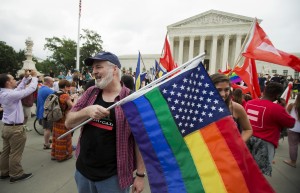Lawmakers around the country cautiously tiptoe on a tightrope as they work to strike a balance between defending religious freedom and enforcing the legalization of gay marriage.

Proponents of religious freedom continue the push to create legislation to defend their cause. The Utah Compromise passed in March is an example of government’s efforts to protect LGBT individuals from discrimination while also protecting religious freedom. The U.S. Supreme Court’s ruling on gay marriage magnified the potential conflicts between same-sex marriage and religious freedom.
Alexander Dushku is an attorney with the Salt Lake firm Kirton McConkie, which has represented the LDS Church in social matters. He said the potential damage religious freedom will suffer in the future depends on how consistently and logically proponents of religious freedom can defend their viewpoints.
“If supporters of traditional marriage retreat, are intimidated into silence and give up trying to find the right words to defend their beliefs, then the court’s gay marriage decision will become a disaster for religious liberty,” Dushku said.
Mark Doxey, a law professor from the BYU International Center of Law and Religious Studies, said religious freedom is “part of our cultural DNA in the United States,” as many of the original colonies served as religious refuges.
Doxey explained that religious freedom is more than Americans having the right to believe what they choose to believe.
“It’s the freedom to be able to manifest or exercise your religion, and to do so in public,” Doxey said.
Panelists at BYU’s Religious Freedom Annual Review in early July discussed 12 potential threats that could conflict with religious freedom due to the Obergefell decision. These threats could affect religious freedom on both an individual and institutional level.
One points of concern is whether the government could take away the tax-exempt status of religions and private religious institutions, a decision that would significantly impact BYU. According to the New York Times, legal scholars said stripping religious organizations of their tax-exemption status is unlikely, but not impossible.
Doxey said a strong case could be made that religious organizations should continue to keep their tax-exempt status.
“The benefits that churches and religions give to society far outweigh any revenue the government could get from that,” Doxey said.
Doxey said the Founding Fathers purposely made religious freedom the first component of the Bill of Rights because of its importance for protecting the overall quality of freedom in the United States.
“Without freedom of conscience, freedom of opinion, freedom of thought, there is no liberty at all. None of the other freedoms really matter,” Doxey said.
Although these threats may be a reality for proponents of religious freedom, advocates for gay marriage emphasize that attacking religious freedom has never been a main point in the push for civil marriage.
“The fight for same-sex marriage has never been a fight against organized religion,” said Sarah Lux-Morgan, marketing manager at Utah Pride Center.
Lux-Morgan said the Utah Pride Center has advocated for gay marriage so the LGBT community could receive the secular, civil benefits enjoyed by married couples.
“The LGBT community of that religion may pursue from within, but it has never been a fight to get churches to perform marriages,” Lux-Morgan said.
Doxey said supporters on either side of the issue would benefit from having empathy and seeking to understand the reasoning of the opposite side. He said supporters of religious freedom would do well to remain constant in their beliefs, but also learn more about the viewpoints of others.
“I’d listen first. And then I’d uphold the idea that religious freedom means we can believe what we want to believe,” Doxey said.
Below is a recording of the interview with Doxey.




